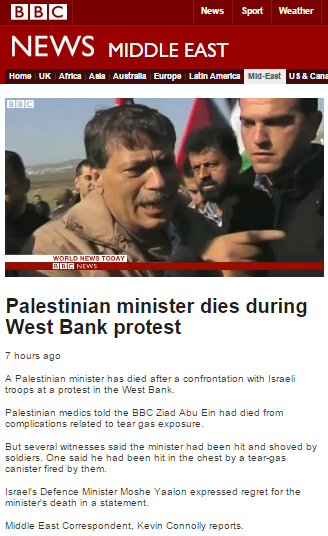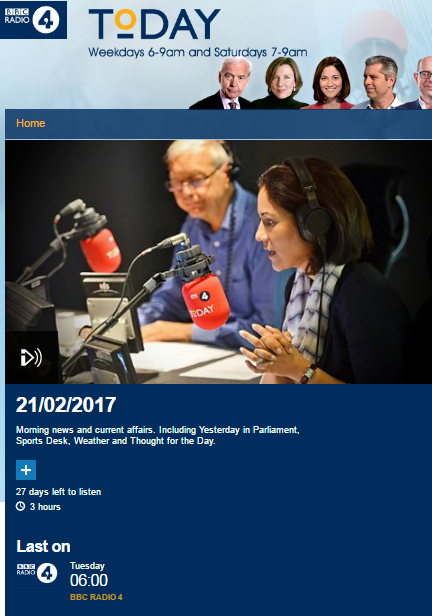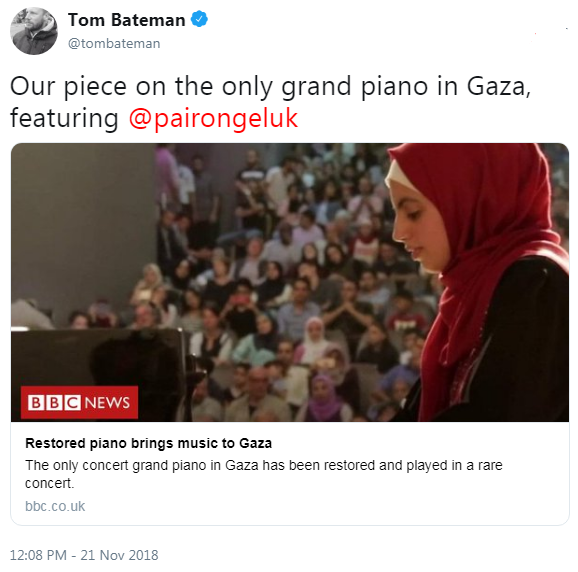As has often been noted here, for years the BBC has reported stories relating to the Boycott, Divestment and Sanctions campaign (BDS) without adequately clarifying to its audiences that what that campaign ultimately seeks to achieve is the end of Israel as the Jewish state. Moreover, in August 2015, we learned that the BBC considers the provision of such crucial background information “not our role“.
So did BBC audiences see any improvement in reporting on that topic in 2018?
The year opened with listeners to BBC Radio 5 live on January 1st hearing a gratuitous and baseless comparison of Israel to the former apartheid regime in South Africa and being repeatedly told that a singer had made the “right” call by giving in to pressure from supporters of a campaign that the BBC presenter made no effort whatsoever to the explain properly.
Radio 5 live item promotes apartheid analogy, breaches style guide
A week later listeners to BBC World Service heard an item which dealt specifically with the subject of the BDS campaign, but once again the BBC did not provide audiences with the clear picture of its aims that they have lacked for years. Rather, in addition to providing an inaccurate definition of the campaign’s goals himself, the presenter allowed his interviewee to promote inaccurate statements and claims with no challenge.
BDS campaigner’s falsehoods go unchallenged on BBC World Service
BBC World Service amends inaccurate photo caption
In April the BBC News website published a report about an Irish BDS supporter in which it used the ‘Israel says’ formula to preface an explanation of the BDS campaign and the subject’s links to it.
BBC News uses ‘Israel says’ instead of fact checking
In May listeners to BBC World Service radio heard promotion of the BDS campaign – which as usual was not explained to audiences – and the ‘apartheid trope from a Palestinian interviewee.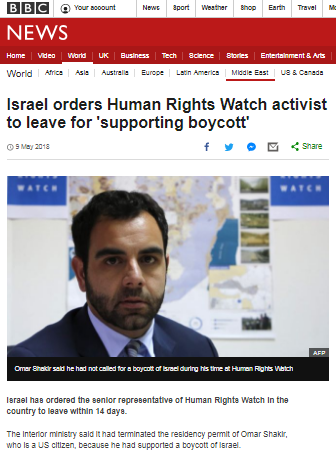
BBC WS radio’s ‘Newshour’ and the split screen – part two
Also in May the BBC News website published a report concerning an employee of a political NGO involved in boycott activities, 25% of which was given over to sympathetic statements.
BBC News website amplifies the NGO echo-chamber
The same month listeners to BBC Radio Ulster heard BDS messaging from a studio guest.
Inaccuracy, omission and oddity in a BBC Radio Ulster item on Israel – part two
In early June the BBC News website failed to adequately portray the role played by BDS campaigners’ threats in the cancellation of a football match.
How BBC News framed the Argentina-Israel football match story
BBC amends misleading Argentina match report after complaint
In August the BBC News website reported a business story while avoiding any mention of its own amplification of a related BDS campaign four years earlier.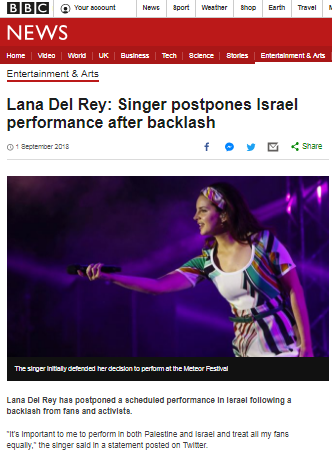
BBC News website’s SodaStream report sidesteps its own previous reporting
In September the BBC News website reported the cancellation of a singer’s performance in Israel and once again made use of the ‘Israel says’ formula.
BBC’s BDS campaign reporting failures continue
Later the same month the BBC News website published a report that included promotion of the ‘apartheid’ smear and amplification of the BDS campaign.
BBC News continues to mainstream BDS and the ‘apartheid’ smear
A BBC News website report published in October erased the participation of BDS campaigners from an account of a ‘tolerance rally’.
Looking beyond the BBC Berlin correspondent’s framing
In November the BBC News website produced inadequate reporting about a boycott campaign initiated by political NGOs.
BBC News website framing of the Airbnb listings story
Later the same month listeners to BBC Radio 4 heard an inadequate report on Quaker support for the BDS campaign.
BBC R4’s ‘Today’ highlights Quaker hypocrisy but still fails listeners
Once again on no occasion throughout 2018 were audiences told in the BBC’s own words that the BDS campaign is opposed to Jews having the basic human right to self-determination in their own country and that denial of Israel’s right to exist is considered – including by the UN Secretary General and according to the definition adopted by the UK government – to be a form of antisemitism.
That obviously hinders the ability of audiences to put the BDS campaign’s claim to be a non-racist human rights organisation into its appropriate context and affects their view of criticism of the campaign from other sources.
The fact that on two occasions in 2018 we saw the BBC News website telling readers that “Israel says the BDS movement opposes the country’s very existence and is motivated by anti-Semitism” does not mean that the story has been reported accurately and impartially.
Related Articles:
Reviewing BBC reporting on the BDS campaign in 2017

